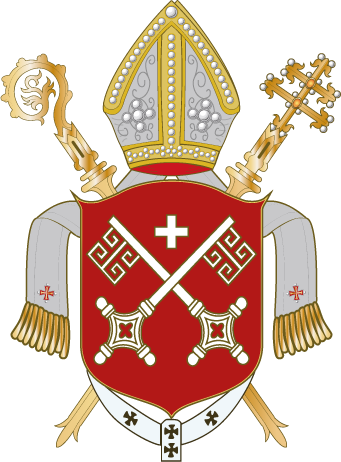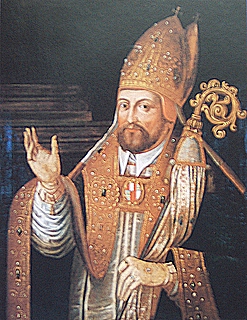|
Archbishops Of Bremen
This list records the bishops of the Archdiocese of Bremen, Roman Catholic diocese of Bremen (), supposedly a suffragan of the Archdiocese of Cologne, Archbishopric of Cologne, then of the bishops of Bremen, who were in personal union archbishops of Hamburg (simply titled Archbishops of Hamburg-Bremen), later simply titled archbishops of Bremen, since 1180 simultaneously officiating as rulers of princely rank (prince-archbishop) in the Prince-Archbishopric of Bremen (; est. 1180 and secularised in 1648), a state of imperial immediacy within the Holy Roman Empire. Bremen and Hamburg were the seats of the Cathedral chapter, chapters at Bremen Cathedral and Hamburg Concathedral, while the incumbents used to reside in Vörde Castle, their castle in Bremervörde, Vörde since 1219. Titles of the incumbents of the Bremian See Not all incumbents of the Bremian See were Holy Roman Empire, imperially invested princely power as Prince-Archbishops and not all were papally confirmed as bis ... [...More Info...] [...Related Items...] OR: [Wikipedia] [Google] [Baidu] |
Archdiocese Of Bremen
The Prince-Archbishopric of Bremen () was an Hochstift, ecclesiastical principality (787–1566/1648) of the Holy Roman Empire and the Catholic Church that after its definitive secularization in 1648 became the hereditary Bremen-Verden, Duchy of Bremen (). The prince-archbishopric, which was under the secular rule of the archbishop, consisted of about a third of the diocesan territory. The city of Bremen was ''de facto'' (since 1186) and ''de jure'' (since 1646) not part of the prince-archbishopric. Most of the prince-archbishopric lay rather in the area to the north of the ''city of Bremen'', between the Weser and Elbe rivers. Even more confusingly, parts of the prince-archbishopric belonged in religious respect to the neighbouring Diocese of Verden, making up 10% of its diocesan territory. History Early diocese of Bremen The foundation of the diocese belongs to the period of the missionary activity of Willehad on the lower Weser. It was erected on 15 July 787 at Worms, Germany, ... [...More Info...] [...Related Items...] OR: [Wikipedia] [Google] [Baidu] |
Elective Monarchy
An elective monarchy is a monarchy ruled by a monarch who is elected, in contrast to a hereditary monarchy in which the office is automatically passed down as a family inheritance. The manner of election, the nature of candidate qualifications, and the electors vary from case to case. Historically, it was common for elective monarchies to transform into hereditary ones (whether legally or ''de facto'') by repeated election of the previous rulers' children, or for hereditary monarchies to acquire elective or semi-elective succession laws, particularly following dynastic crises. Evolution Many kingdoms were officially elective historically, though the candidates were typically only from the family of the deceased monarch. Eventually, however, most elected monarchies introduced hereditary succession, guaranteeing that the title and office stayed within the royal family and specifying, more or less precisely, the order of succession. Today, almost all monarchies are hereditary mon ... [...More Info...] [...Related Items...] OR: [Wikipedia] [Google] [Baidu] |
Northumbria
Northumbria () was an early medieval Heptarchy, kingdom in what is now Northern England and Scottish Lowlands, South Scotland. The name derives from the Old English meaning "the people or province north of the Humber", as opposed to the Southumbria, people south of the Humber, Humber Estuary. What was to become Northumbria started as two kingdoms, Deira in the south and Bernicia in the north. Conflict in the first half of the seventh century ended with the murder of the last king of Deira in 651, and Northumbria was thereafter unified under Bernician kings. At its height, the kingdom extended from the Humber, Peak District and the River Mersey on the south to the Firth of Forth on the north. Northumbria ceased to be an independent kingdom in the mid-tenth century when Deira was conquered by the Danelaw, Danes and formed into the Kingdom of York. The rump Earl of Northumbria, Earldom of Bamburgh maintained control of Bernicia for a period of time; however, the area north of R ... [...More Info...] [...Related Items...] OR: [Wikipedia] [Google] [Baidu] |
Willehad
Willehad or Willihad (); 745 AD 8 November 789) was a Christian missionary and the Bishop of Bremen from 787 AD. Life Willehad was born in Northumbria and probably received his education at York under Ecgbert. He was a friend of Alcuin. He was ordained, and about the year 766, he went to Frisia, preaching at Dokkum and in Overijssel, to continue the missionary work of Boniface who had been martyred by the Frisians in 754. At an assembly in Paderborn in 777, Saxony was divided into missionary zones. The zone between the Weser and the Elbe, called ''Wigmodia'', was given to Willehad. From 780 Willehad preached in the region of the lower Weser River on commission from Charlemagne. He barely escaped with his life when the Frisians wanted to kill him and he returned to the area around Utrecht. Once again he and his fellow missionaries barely escaped with their lives when the local pagans wanted to kill them for destroying some temples. Finally, in 780, Charlemagne sent him ... [...More Info...] [...Related Items...] OR: [Wikipedia] [Google] [Baidu] |
Bischof Willehad 1
Bischof () is a surname. Notable people with the surname include: * Gustav Bischof (1792–1870), German chemist * Horst Bischof (born 1967), Austrian computer scientist * Frank-Peter Bischof (born 1954), German canoeist * Werner Bischof (1916–1954), Swiss photographer * Kerstin Bischof (born 1980), German singer, vocalist of Xandria See also * Bischoff * Bishop A bishop is an ordained member of the clergy who is entrusted with a position of Episcopal polity, authority and oversight in a religious institution. In Christianity, bishops are normally responsible for the governance and administration of di ... {{surname, Bischof German-language surnames Occupational surnames ... [...More Info...] [...Related Items...] OR: [Wikipedia] [Google] [Baidu] |
Vicar Apostolic
A vicar (; Latin: ''vicarius'') is a representative, deputy or substitute; anyone acting "in the person of" or agent for a superior (compare "vicarious" in the sense of "at second hand"). Linguistically, ''vicar'' is cognate with the English prefix "vice", similarly meaning "deputy". It also refers to a senior priest in the Church of England. The title appears in a number of Christian ecclesiastical contexts, but also as an administrative title, or title modifier, in the Roman Empire. In addition, in the Holy Roman Empire, a local representative of the emperor, such as an archduke, could be styled "vicar". Catholic Church The Pope bears the title vicar of Christ (Latin: ''Vicarius Christi''). In Catholic canon law, ''a vicar is the representative of any ecclesiastic'' entity. The Romans had used the term to describe officials subordinate to the praetorian prefects. In the early Christian churches, bishops likewise had their vicars, such as the archdeacons and archpriests, and ... [...More Info...] [...Related Items...] OR: [Wikipedia] [Google] [Baidu] |
Episcopal See
An episcopal see is the area of a bishop's ecclesiastical jurisdiction. Phrases concerning actions occurring within or outside an episcopal see are indicative of the geographical significance of the term, making it synonymous with ''diocese''. The word ''see'' is derived from Latin , which in its original or proper sense denotes the seat or chair that, in the case of a bishop, is the earliest symbol of the bishop's authority. This symbolic chair is also known as the bishop's . The church in which it is placed is for that reason called the bishop's cathedral, from Latin , meaning the 'church of the '. The word ''throne'' is also used, especially in the Eastern Orthodox Church, both for the chair and for the area of ecclesiastical jurisdiction. The term ''see'' is also used of the town where the cathedral or the bishop's residence is located. Catholic Church Within Catholicism, each diocese is considered to be a see unto itself with a certain allegiance to the See of Rome. ... [...More Info...] [...Related Items...] OR: [Wikipedia] [Google] [Baidu] |
Diocesan Administrator
A diocesan administrator (also known as archdiocesan administrator, archiepiscopal administrator and eparchial administrator for the case, respectively, of an archdiocese, archeparchy, and eparchy) is a provisional ordinary of a Catholic particular church. Diocesan or archdiocesan administrators in canon law The college of consultors elects an administrator within eight days after the see is known to be vacant. The college must elect as administrator a priest, bishop, or archbishop at least 35 years old. If the college of consultors fails to elect a priest of the required minimum age within the time allotted, the choice of an administrator passes to the metropolitan archbishop or, if the metropolitan see is vacant, to the senior by appointment of the suffragan bishops of the ecclesiastical province. If a diocese has a coadjutor bishop, the coadjutor succeeds immediately to the episcopal see upon the previous bishop's death or resignation, and there is no vacancy of the se ... [...More Info...] [...Related Items...] OR: [Wikipedia] [Google] [Baidu] |
Prince-bishop
A prince-bishop is a bishop who is also the civil ruler of some secular principality and sovereignty, as opposed to '' Prince of the Church'' itself, a title associated with cardinals. Since 1951, the sole extant prince-bishop has been the Bishop of Urgell, Catalonia, who has remained ''ex officio'' one of two co-princes of Andorra, along with the French president. Overview In the West, with the decline of imperial power from the 4th century onwards in the face of the barbarian invasions, sometimes Christian bishops of cities took the place of the Roman commander, made secular decisions for the city and led their own troops when necessary. Later relations between a prince-bishop and the burghers were invariably not cordial. As cities demanded charters from emperors, kings, or their prince-bishops and declared themselves independent of the secular territorial magnates, friction intensified between burghers and bishops. The principality or prince-bishopric (Hochstift) r ... [...More Info...] [...Related Items...] OR: [Wikipedia] [Google] [Baidu] |
Archbishop
In Christian denominations, an archbishop is a bishop of higher rank or office. In most cases, such as the Catholic Church, there are many archbishops who either have jurisdiction over an ecclesiastical province in addition to their own archdiocese ( with some exceptions), or are otherwise granted a titular archbishopric. In others, such as the Lutheran Church of Sweden, the title is only borne by the leader of the denomination. Etymology The word ''archbishop'' () comes via the Latin . This in turn comes from the Greek , which has as components the etymons -, meaning 'chief', , 'over', and , 'guardian, watcher'. Early history The earliest appearance of neither the title nor the role can be traced. The title of "metropolitan" was apparently well known by the 4th century, when there are references in the canons of the First Council of Nicæa of 325 and Council of Antioch of 341, though the term seems to be used generally for all higher ranks of bishop, including patriarc ... [...More Info...] [...Related Items...] OR: [Wikipedia] [Google] [Baidu] |
Bishop (Catholic Church)
In the Catholic Church, a bishop is an Holy orders in the Catholic Church, ordained Minister (Catholic Church), minister who holds the fullness of the Sacraments of the Catholic Church, sacrament of holy orders and is responsible for teaching doctrine, governing Catholics in his Ecclesiastical jurisdiction, jurisdiction, sanctifying the world and representing the church. Catholics trace the origins of the office of bishop to the Apostles in the New Testament, apostles, who it is believed were endowed with a special charism and office by the Holy Spirit in Christianity, Holy Spirit at Pentecost. Catholics believe this special charism and office has been transmitted through an apostolic succession, unbroken succession of bishops by the laying on of hands in the sacrament of holy orders. Diocesan bishops—known as eparchial bishops in the Eastern Catholic Churches—are assigned to govern local regions within the Catholic Church known as dioceses in the Latin Church and Eparchy ... [...More Info...] [...Related Items...] OR: [Wikipedia] [Google] [Baidu] |
Investiture
Investiture (from the Latin preposition ''in'' and verb ''vestire'', "dress" from ''vestis'' "robe") is a formal installation or ceremony that a person undergoes, often related to membership in Christian religious institutes as well as Christian knighthoods or damehoods, in addition to government offices. In an investiture, a person may receive an outward sign of their membership, such as their religious habit, an ecclesiastical decoration (as with chivalric orders) or a scapular (as with confraternities); they may be given the authority and regalia of a high office. Investiture can include formal dress and adornment such as robes of state or headdress, or other regalia such as a throne or seat of office. An investiture is also often part of a coronation rite or enthronement. Christianity Religious institutes Investiture indicates in religious orders the usually ceremonial handing over of the religious habit to a new novice. The investiture usually takes place upon admission to ... [...More Info...] [...Related Items...] OR: [Wikipedia] [Google] [Baidu] |





